|
lick pictures for a larger version.
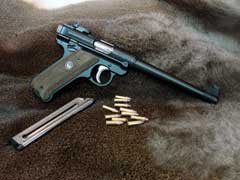
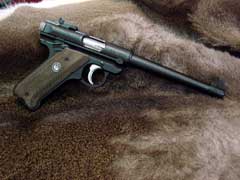
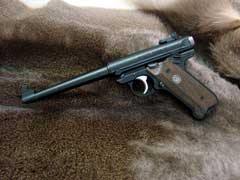
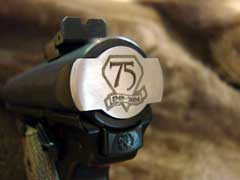
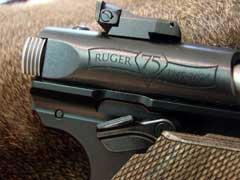
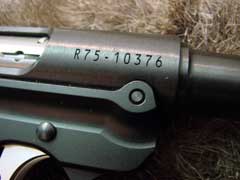
75th Anniversary Mark IV features special commemorative
markings and serial number prefix.
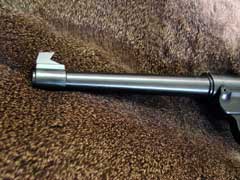
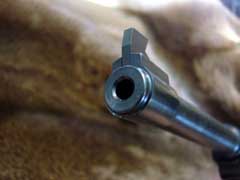
6-7/8" slim-taper barrel.
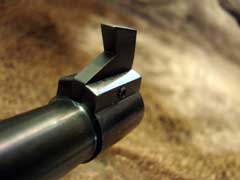
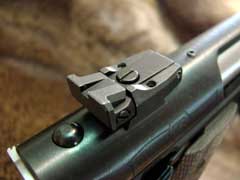
Undercut Patridge-style front sight (top) and fully-adjustable rear sight
(bottom).
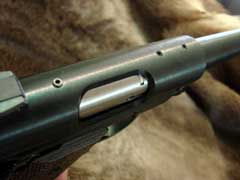
Receiver is drilled and tapped for Weaver / Picatinny optic mount.
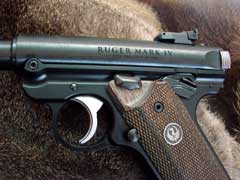
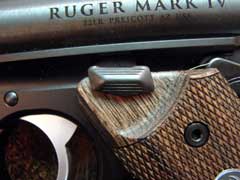
Bolt stop holds the action open on an empty magazine.
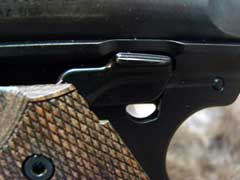
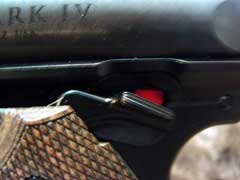
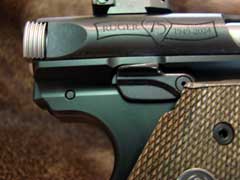
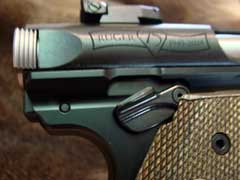
Ambidextrous thumb safety.
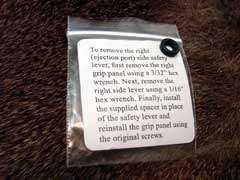
An ambidextrous safety delete kit is included for those who wish to delete
the starboard-side safety lever.
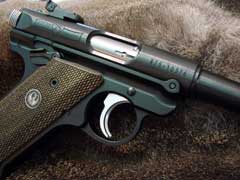
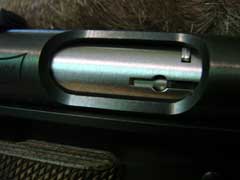
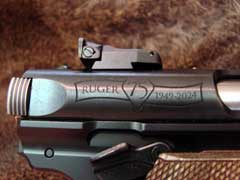
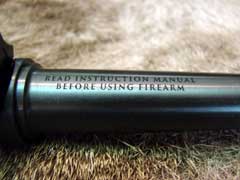
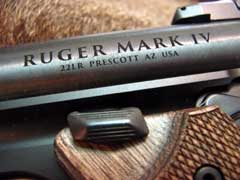
|
|
In 2024, Ruger
celebrates its 75th (Diamond) Anniversary. From the humblest of
beginnings in 1949, Ruger has become America's most successful
gun maker, and arguably the greatest firearms company in
history. The story of Ruger is the story of America from the
second half of the 20th Century onward, and is also largely the
story of my own life, as I have walked life's pathway from my
youth onward with Rugers by my side.
And it all started with a simple little 22
semi-automatic pistol.
In 1949, a young inventor named William B.
Ruger (who would in time become known as the greatest firearms
designer since John M. Browning) approached a young financier
named Alex Sturm with a prototype of a new 22 rimfire semi-auto
pistol. The pistol was a soundly designed piece that was
inexpensive to produce, reliable, and had pleasing lines to
boot. Ruger had the original design and the manufacturing
knowledge to make it a reality, but he needed the venture
capital required to start his company. Sturm, a young aristocrat
with a love of sport shooting, invested $50,000, and Sturm,
Ruger & Co. was born. A favorable review by Maj. Gen. Julian
S. Hatcher, then Technical Director for the NRA, brought the
innovative new 22 to the attention of the American gun buyer as
a fine, reliable little 22 that could be had at a very
economical price. The modest 1949 American Rifleman
advertisement that started it all offered "The .22 Ruger
Pistol" for only $37.50 (a little over 460 of today's
dollars), heralding it as "An Achievement in the Great
Tradition of American Arms Makers". This proved to not be
hyperbole, as the little 22 has since proven to be rugged,
reliable, and accurate, and quickly became America's favorite 22
pistol.
Thus, Sturm, Ruger & Co. began a journey
that would lead to the company becoming the largest and most
respected manufacturer of sporting firearms in the U.S. The
little gun that started it all was a simple, reliable and
attractive 22 rimfire blowback-operated semi-automatic pistol
with a tubular receiver and a cylindrical bolt, a distinctive
slim-tapered barrel, and a profile that was somewhat reminiscent
of the famed German Luger 9mm pistol, as well as the Japanese
Nambu 8mm pistol. The Ruger 22 pistol, called the "Standard
Auto", was blued steel with the bolt "in the
white" or unfinished so as to give an attractive contrast
to the blued steel receiver.
Ruger's 22 auto pistols have been in
continuous production throughout the life of the company, and
millions have been produced to date; the Ruger 22 pistol has
dominated the market for three-quarters of a century, and shows
no sign of slowing down. It is available today in many different
configurations: standard or target models, fixed or adjustable
sights (all optics-ready), short or long barrels, tapered or
bull barrels, stainless or blued steel, and even aluminum or
polymer frames with different grip angles.
As the decades have gone by, Ruger has
continually upgraded their 22 pistols, adding design features
that have substantially improved on the original design. First,
in 1951, Ruger introduced the Mark I Target Pistol, which was
basically the original Standard Auto with the addition of a
6-7/8" Heavy-Tapered barrel (as opposed to the Standard
Auto's 4" Slim-Tapered barrrel) and fully-adjustable target
sights (as opposed to the Standard Auto's fixed sights). Ruger
introduced the Mark II in 1982, with the addition of a bolt stop
to hold the bolt open on an empty magazine. The Mark III,
introduced in 2005, saw the magazine release mechanism change
from the original European-style heel release to the more
familiar magazine release button located on the frame's port
side behind the trigger guard, as well as scallops milled into
the rear of the receiver to allow the bolt's cocking ears to be
grasped more easily. Finally, the Mark
IV was introduced in 2016, with a much easier
disassembly/assembly mechanism. Earlier versions stripped by use
of a takedown lever in the backstrap, requiring three hands, a
big hammer, and an extensive vocabulary of expletives to
reassemble the pistol; the Mark IV disassembles by simply
pushing a button at the rear of the pistol, and tipping the
receiver upward off the frame. The pistol reassembles
intuitively in reverse order, taking only seconds and eliciting
tears of joy for those of us who have spent many hours over the
years cussing the earlier versions. The Mark IV also saw the
addition of a much-improved safety lever, which is better
located and easier to operate, as well as being an ambidextrous
design, which was especially welcome to the Southpaws among us.
While the profile of the grip frame remains
the same as the Standard Auto and later Mark Series pistols
(with the exception of the 22/45 models, which employ a
1911-inspired polymer frame design), the construction is
entirely different. Since 1949, the grip frames on most Ruger 22
pistols have been constructed of stamped steel, welded together
and fitted with the fire control parts, with the trigger guard
being a separate piece. The Mark IV grip frame is CNC machined
from solid stainless steel or aluminum, depending upon the
pistol's finish, with the trigger guard being integral to the
rest of the grip frame. Stainless
pistols have a stainless grip frame, while blued pistols have a
lightweight aluminum grip frame, making the blued pistol about
six ounces lighter than comparable stainless pistols.
The
bolt stop has been redesigned for the Mark IV, making it easier
to use than the bolt stops on Mark II and Mark III pistols.
Internal changes to the hammer, bolt, firing pin, and sear,
along with the welcome elimination of the loaded-chamber
indicator of the Mark III, makes the pistol run smoother than
before. Mark III magazines will also work in the new Mark IV
pistols, and the sights are the same, so Ruger sights, as well
as aftermarket sights, will work on the new pistol, and the Mark
IV also uses the same optics mounts as the Mark III pistols.
To
commemorate the company's 75th Anniversary, Ruger has just
introduced the latest version of the Mark IV, the 75th
Anniversary Mark IV™ Target pistol. Featuring all the design
improvements of the Mark IV, the 75th Anniversary model seeks to
recapture the spirit of the original Standard Auto, and does so
in fine fashion.
Crafted
from blue-finished alloy steel with matching-finished aluminum
grip frame, the 75th Anniversary Mark IV evokes the spirit of
the original 1949 Standard Auto, but is in reality closer to the
1951 Mark I target version, due to its barrel and sight
configuration. Like the Mark I, the 75th Anniversary Mark IV
sports a 6-7/8" barrel; but rather than the heavy-tapered
barrel of the Mark I, the 75th Anniversary Mark IV's barrel is
slim-tapered, a longer version of the 4" slim-tapered
barrel of the original Standard Auto. Also, like the Mark I
target version, the 75th Anniversary Mark IV features a superb
set of fully-adjustable sights, as opposed to the fixed sights
of the original 1949 Standard Auto. The 75th Anniversary Mark
IV's front sight is a pinned-in, undercut Patridge style blade
in a barrel-band base, while the rear sight is fully adjustable
for windage and elevation, and dovetail-mounted into the
receiver. Also, like all Mark IV pistols, the 75th Anniversary
Mark IV is drilled and tapped for a Weaver or
Picatinny-compatible optics mount; the excellent open sights and
optics capability allow the shooter to take full advantage of
the outstanding accuracy afforded by the pistol's cylindrical
bolt design and stationary sights.
The
Mark IV's ambidextrous safety is a feature that was heartily
welcomed by left-handed shooters, and it works wonderfully, but
for some right-handed shooters the starboard-side lever might
possibly get in the way a bit. For those who would like to
delete the ambidextrous control, Ruger includes a delete kit,
consisting of a drop-in part that is very easy to replace. I
will leave mine alone, thank you, but the option is there for
those who want it.
The
75th Anniversary Mark IV's grip panels are wood laminate, giving
the pleasing, traditional appearance of nice walnut, and are
fully checkered, with a Ruger medallion inlaid into each panel.
These are, of course, interchangeable with any grip panels that
will fit the Mark IV pistols, with many choices available from
Ruger's Online Store (https://shopruger.com/),
as well as other sources. I consider the factory grips to be
quite attractive and effective, so I see no need to change them,
but to each his own.
A
peaceful afternoon of 22 Long Rifle shooting is always a
pleasure, especially when shooting the lightly-recoiling
cartridge from a pistol as accurate and ergonomic as the 75th
Anniversary Mark IV Target. The sights performed perfectly,
presenting a crisp and clear sight picture, regardless of the
sun's position. The pistol's balance was superb, with the
lightweight aluminum frame more than offsetting the extra weight
of the added barrel length, perfectly balancing in the hand and
hanging without a wobble. The lightweight aluminum, grooved
target-style trigger released at an average of 2 pounds, 3.3
ounces on my example, meaning that any pine cones, walnuts,
rocks, or other targets of opportunity within sight were
definitely in jeopardy. When it came to more formal group
shooting, sub-one-inch groups at five yards were easy to achieve
with a variety of loads, from standard-velocity target solids to
high-velocity hollowpoints. Reliability was nearly 100 percent,
the only bobbles being one failure to eject using ancient
Winchester target ammo, and one misfire using some old Remington
fodder; this was not the pistol's fault, as the rim had a good
dent in it, and subsequent attempts to ignite it also failed.
Even my favorite standard-velocity target loads, CCI's Standard
Velocity 40-grain solids, ran perfectly in the 75th Anniversary
Mark IV; this is often not the case when using the CCI ammo in
semi-auto pistols, as the lower-velocity ammo sometimes lacks
the power to reliably cycle a pistol's slide, but the CCI target
load runs like a champ in the Mark IV, thanks to the Ruger's
cylindrical bolt having less mass than a typical slide. The 75th
Anniversary Mark IV Target is more than adequate for informal
plinking, competition, or hunting use, and I highly recommend
it.
Specifications - Ruger®
75th Anniversary Mark IV™ Target 22 Semi-Aiuto Pistol
| Model # |
40175 |
| Receiver |
Alloy
steel, Blue Finish |
| Barrel |
Alloy
Steel, Blue Finish, 6.88 Inches, Tapered Target,
6-Groove, 1"16" RH Twist |
| Grip Frame |
Aluminum,
Black Finish |
| Grips |
Checkered
Wood Laminate |
| Overall
Length |
11.00
Inches |
| Overall
Height |
5.58
Inches |
| Overall
Width |
1.20
Inches |
| Weight |
32.8
Ounces |
| Front
Sight |
Fixed
Undercut Patridge |
| Rear Sight |
Adjustable |
| Trigger |
Aluminum,
Grooved Target Style |
| Trigger
Pull |
2 Pounds,
3.3 Ounces |
| Magazine
Capacity |
10+1 |
| Magazines
Included |
2 |
| Accessories
Included |
Commemorative
Box, Manual, Cable Lock, 75th Anniversary Sticker |
| Available
in CA / MA |
NO |
| UPC |
7-36676-40175-8 |
| MSRP as of
January 2024 |
$599.00 US |
As
would be expected on a commemorative model, the 75th Anniversary
Mark IV Target has special markings to distinguish it from its
plainer sisters. The rear face of the bolt bears a 75th
Anniversary logo, consisting of "75" inside of a
diamond, over a banner bearing the legend "1949 -
2024". The starboard side of the receiver, behind the
ejection port, bears a similar logo, and the pistols are
serially numbered with an "R75" prefix. These
decorations are meaningful and tasteful, while adding basically
nothing to the cost of the pistol.
Like
all Mark IVs, the 75th Anniversary Mark IV ships with two
ten-round stainless steel magazines. The 75th Anniversary
package also includes a special commemorative cardboard box,
along with the usual paperwork, a cable lock, and a nice 75th
Anniversary sticker that will find a place of honor on my main
mandolin case. The Ruger 75th Anniversary Mark IV Target pistol
is an accurate, beautiful, fitting, and affordable
commemorative, fulfilling the original 1949 Standard Auto's
promise of economical quality. Current retail price of the 75th
Anniversary Mark IV is $599.00 US, which is only $30.00 more
than the base Mark IV with fixed sights.
Bill
Ruger would be proud.
Ruger®: https://ruger.com/
https://ruger.com/products/markIVTarget/specSheets/40175.html
To Find a Ruger®
Dealer Near You, Click on the DEALER FINDER at Lipsey's: http://www.lipseys.com/
Order Ammo Online at
Lucky Gunner: https://www.luckygunner.com/rimfire/22-lr-ammo
CCI® Ammunition: https://www.cci-ammunition.com/
Eley® Ammunition: https://www.eleyammunition.com/
Federal® Ammunition:
https://www.federalpremium.com/
Lyman Products: https://www.lymanproducts.com/
https://www.lymanproducts.com/electronic-digital-trigger-pull-gauge
Boge Quinn
  
Got something to say about this article?
Want to agree (or disagree) with it? Click the following link to
go to the GUNBlast Feedback Page.
|
|
Click pictures for a larger version.
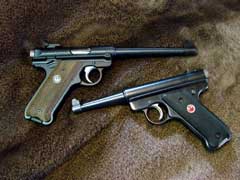
75th Anniversary Mark IV Target (top) compared to an
original Standard Auto (bottom).
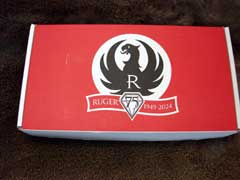
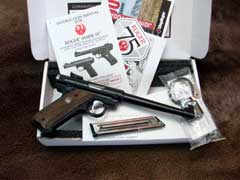
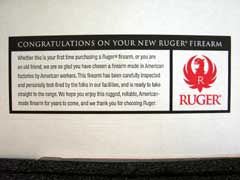
75th Anniversary Mark IV Target comes with
commemorative cardboard box, manual, cable lock, and 75th
Anniversary sticker.
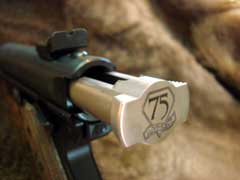
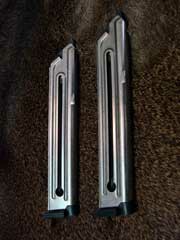

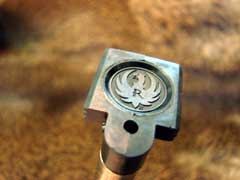
Like all Mark IV pistols, the 75th Anniversary Target
comes with two ten-round stainless steel magazines.
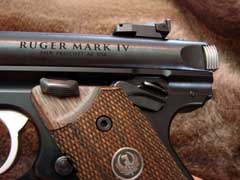
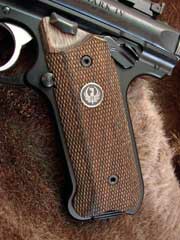
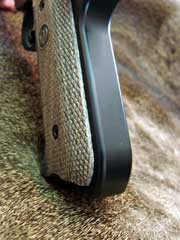
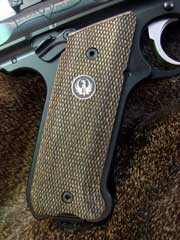
Finely checkered wood-laminate grip panels give the
traditional appearance of walnut.
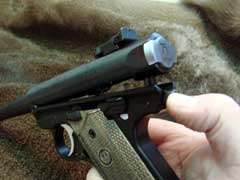
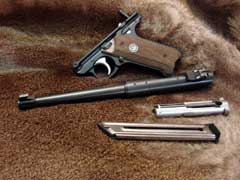
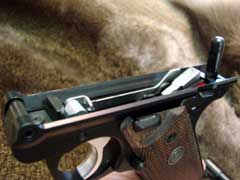
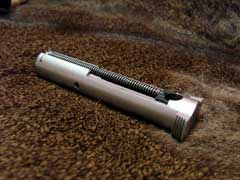
The Mark IV design greatly simplifies stripping &
reassembly over previous versions.
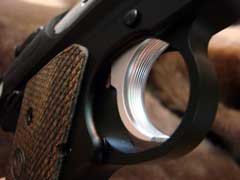
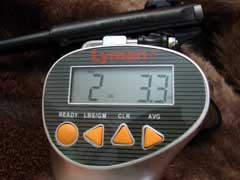
Lightweight, grooved aluminum target trigger is crisp
and light, aiding in accuracy.
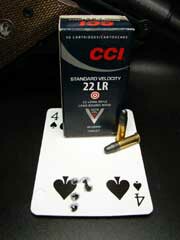
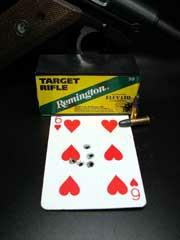
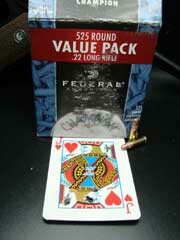
The 75th Anniversary Mark IV Target proved to be very
accurate, and 100 reliable, with both standard-velocity and
high-velocity ammunition.
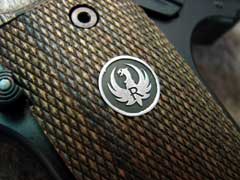
|
![]()